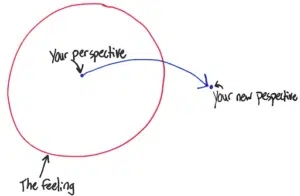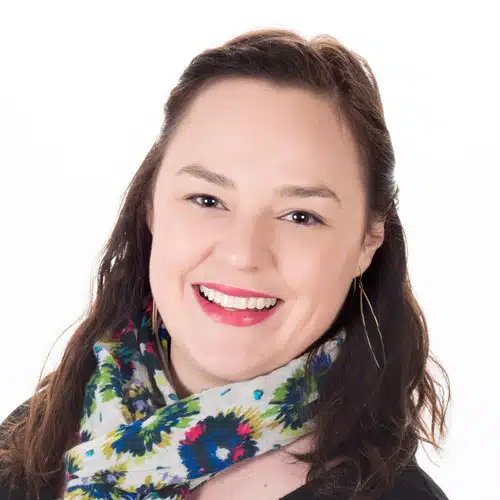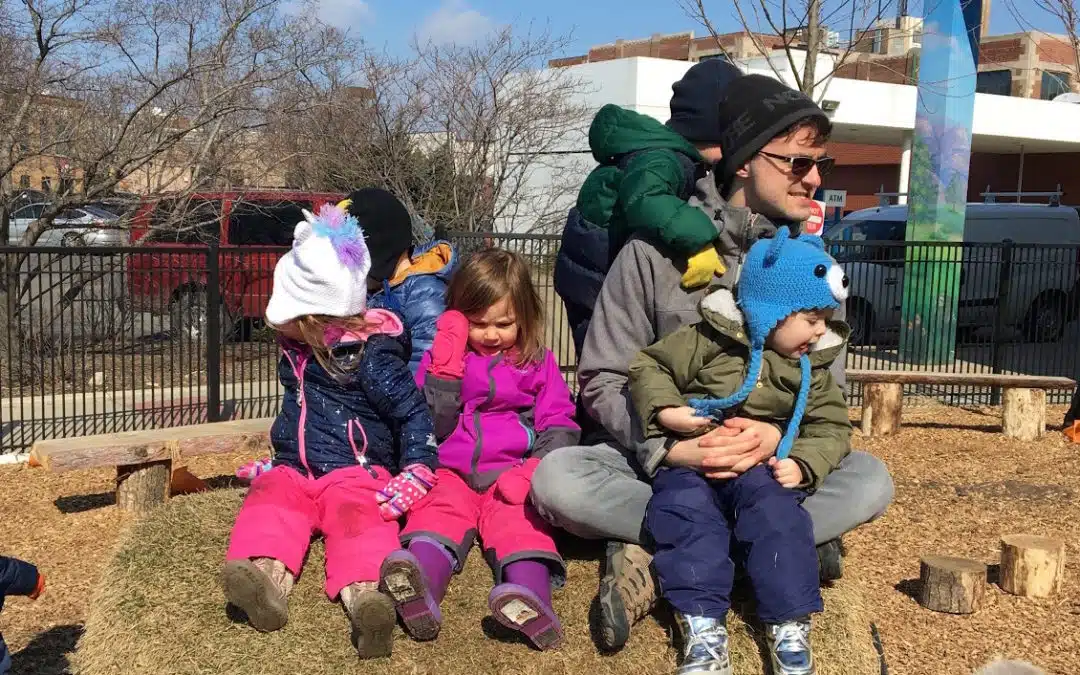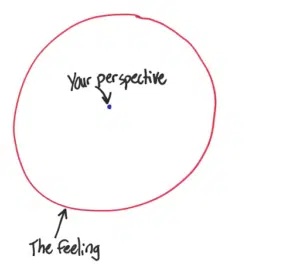When I think of our Arts Integrated Preschool Team, I think of an incredibly creative, passionate, curious and patient group of Teaching Artists. But, one of the most patient and curious teachers we have is Jason Clark, or “Mr. Jason”. I first met him when we hired him to provide some childcare during one of my workshops for parents on Sensory Processing, and I was immediately struck by the calm and patient energy he used with the children who were there. Needless to say, we scooped him up and made him an integral part of our Preschool Team. I’d love to give you all a window into his perspective and process in the hopes that we can all begin to approach the young children in our lives with a bit of that same patient energy. Check out our interview below!
So, what’s your secret to staying to calm and present in the classroom?
Meditation has been one of the most useful skills/practices I have for working with young children. One of the best choices I ever made for myself was participating in the Carleton Buddhist Studies abroad program my senior year of college. The program is 12 weeks long, with 9 of those weeks being based around a twice-daily period of meditation practice and teachings. This program undeniably changed my life for the better. For me, a deep dive into meditation practices did everything you’ve heard it is able to do: it reduced my stress and anxiety (especially socially), it helped me be more happy and joyful, it made my relationships better, it increased my focus, it helped me deal with negative emotions in myself in a more productive and kind way, and it made me more patient.
Can you tell us a little bit more about your personal meditation practice?
The practice that I most often do these days is a Vipassana practice. “Vipassana” is a Pali word that frequently gets translated to “insight.” It is a practice designed to bring us into the present moment, to become aware of what is actually happening to us right here and right now. The technique is really straightforward: you start by holding a light focus on your breath. When something comes into your consciousness more strongly than your breath, you simply notice it until it passes. So, if I am meditating and I notice that I have been thinking about what I should make for dinner tomorrow, I simply note, gently and in my head, “thinking” until that thought passes. If I notice that I’m stressing out about the whole state of the world, I simply note “thinking” until it passes. If I notice that my leg hurts a bit, I simply note “pain” until it passes. If I notice some other sensation in my body, I simply note “feeling” until it passes.
It is important to note: there is no way to do this practice wrong. I have had sits where I’ve spent basically the whole time lost in thought and didn’t notice this until the timer I had set went off; that’s okay! I did eventually notice that I had been thinking and that’s the part that’s important. You don’t have to stop thinking because that’s impossible. All you have to do is notice what is happening whenever you can.
What benefits have you noticed from this type of meditation practice?
Well, there are some obvious benefits that you can probably already guess at – increased patience is one that people mention to me a lot when I bring up this topic. And that is definitely true! But I think the benefits run a lot deeper than that and the mechanisms by which patience gets increased allow for lots of other benefits. To help explain, I made a couple of diagrams.
This is what happens when I have a strong feeling (whether that feeling is positive or negative). My perspective is INSIDE that feeling. It affects how I see the situation and it affects how I respond, from the words I say to the tone of my voice to my body language. It is from this perspective that I get in an argument with one of the kiddos because they’re not doing what I want them to.
With mindfulness, though, there is the possibility to change that diagram a bit:

It is from this, shifted, perspective that I am able to consider why this child isn’t doing what I want, what need they are expressing in acting differently, and whether my desire for them to do what I want them to do is actually justified.
One of the core values of the Bubbles preschool team is the idea of “curiosity over assumption.” In other words, instead of believing that we know why a kid is behaving a certain way, we try to ask questions: what are they trying to communicate with this behavior? What needs to be met? Have they behaved like this before? If yes, are there any similarities in the context to last time? Have they eaten? Did they sleep? We ask all these questions so we can try to understand them better and therefore help them to grow. And that all sounds nice and high-minded, but let’s be real: working with young children can be remarkably frustrating, and the idea of pausing in the midst of the third temper tantrum of the day to “get curious” can seem impossible. And, it’s important to note; that’s okay! Not everyday will be perfect, and it’s just as important for your kids to know that you have feelings too. But, sometimes, mindfulness can give you just enough space between the thoughts “I’m going to tear my hair out” and “what did I do to deserve this???” to maybe sneak a bit of curiosity in. Or at least to say “I’m feeling really frustrated right now, I think I need to take a break.”
What advice or resources do you have to share with anyone who is looking to embark on a meditation practice journey?
If you wanted to, I think just jumping straight into a Vipassana practice on your own is a relatively low-risk approach – especially if you start at a pretty short amount of time (5 minutes or less) and slowly up the time as it gets more comfortable. That being said, I am NOT a meditation teacher and sitting in the quiet with your thoughts can be an overwhelming experience – especially right now. If you’re looking for something a bit more structured or guided, here are some resources:
APPS:
- Headspace. This is the brainchild of Andy Puddicombe, so you get to listen to his delightful British accent while you meditate. This is a subscription based service, but it has some basic, free meditations you can do. It also has a kid’s mode that is quite delightful!
- 10% Happier. This was started by Dan Harris, an ABC News correspondent who started meditating after he had a panic attack on live television. This app is more explicitly Buddhist, and they offer different courses with different teachers
- Calm. This one is more oriented to relaxing/de-stressing than meditation.
- Insight Meditation Timer. I use this for the timer function, it has a lovely variety of meditation bells you can use to mark the beginning and end of your meditations. It also has a lot of guided meditations.
BOOKS:
- Pretty much anything by Sharon Salzberg, but especially “Lovingkindness.” Lovingkindness practices are her forte, and are essential right now. They help us to be gentler and more loving with the people around us – especially ourselves! Her books frequently include practices and exercises as well as teachings, which can make them a great companion for someone starting to meditate.
- “The Experience of Insight” by Joseph Goldstein who is of the same cohort as Sharon Salzberg – they’re two of the founders of Insight Meditation Society in Barre, MA, one of the most respected meditation institutions in the States.
- If you’re looking for something a bit weirder and a bit more abstract, I highly recommend reading “Zen Mind, Beginner’s Mind” by Shunryu Suzuki. It’s strange and delightful and mind-bending; if it resonates with you, I promise it’ll get you to see things in a new way.
ONLINE MEDITATIONS:
Insight Meditation Society (IMS) Facebook Live meditations: Insight Meditation Society’s co-founders include Sharon Salzberg and Joseph Goldstein, so their practices will probably be more in line with the mindfulness practice we’ve discussed above. The schedule is here
Tricycle online practice sessions: Tricycle is a Buddhist magazine. Some of the teachers are Sharon Salzberg, Jack Kornfield (another IMS co-founder), and Pema Chödrön (an American Tibetan Buddhist nun).
Phakchok Rinpoche teaching on compassion and medicine: Phakchock Rinpoche is a Tibetan meditation teacher, so these teachings will definitely be pretty different from mindfulness. Recommended for people who are willing to get a little bit deep and (probably) a little bit weird.
Online Zendo, from The Village Zendo: This is a Zen resource, so the practice will be a bit different than the mindfulness practice described above. They do two 25-minute periods of meditation followed by some chanting.
Thank you so much for giving us a window into your meditation practice and how it serves you as an Early Childhood Professional! I hope all of you parents and caregivers who are reading are inspired to give some of these practices a try!
Yes, thanks so much! I hope this all is helpful and please feel free to reach out to me at [email protected] with any questions!

Samantha Perry
Samantha Perry is the Director of Bubbles Academy’s Arts-Integrated Preschool Program. She is also the recipient of the Harris Foundation’s Scholarship for Excellence in Leadership and received her Master of Science in Child Development with a specialization in Administration at Erikson Institute. The Harris Excellence Scholarships are awarded annually to a select number of students with excellent academic credentials and a demonstrated commitment to the field of early childhood.
Sam is grateful for the opportunity to use both her theatrical expertise, and broad knowledge of needs of young children at Bubbles Academy’s arts-integrated preschool program. As an educator, Sam strives to inspire confidence, independence, curiosity and creativity in each of her students every day.

